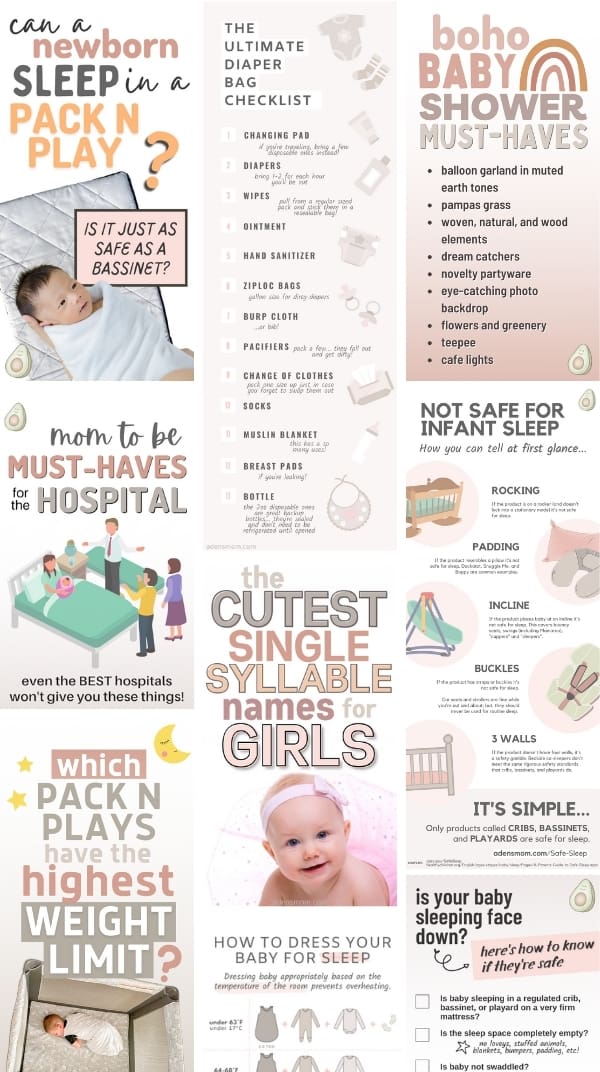Tired and huge? Here’s a list of things to do before baby comes that you can tackle from the comfort of your bed or couch!
You’re very pregnant, you have a million “to dos” swirling around in your brain, but all you can think about is how comfy your bed looks.
The good news is that there are lots of things you can do to prepare for your baby’s arrival while you kick up your (swollen) feet.
Everything on this pre-baby checklist can be done lying down, whether you’re officially on bed rest or just a really tired pregnant person! All you need is your phone or laptop.
Let’s dive into this list of things to do before baby!
TIP BEFORE WE GET STARTED:
This guide is jam-packed with golden nuggets and helpful resources. I’m about to send you down a bunch of rabbit holes to help you prepare for your baby.
Click the button below to email yourself the link so you can easily come back to it later.
Table of Contents
- Things to do on your phone before baby comes
- Things to do on your phone or computer before baby arrives
- Conversations to have before baby comes
- Mentally prepare for labor and delivery before your due date
- Pre-baby lists to make
- Stuff to figure out before baby
- Things to plan before baby is born
- Videos to watch before baby comes
- Prepare for the 4th trimester before baby arrives
- Things to learn about before baby
- Other things to do before baby
There may be affiliate links in this post. Read this disclosure policy to learn more.
PIN FOR LATER

Things to do on your phone before baby comes
All you need for this section is your phone (or tablet) and maybe a charger!
 Download these 3 apps
Download these 3 apps
![]() Contraction timer
Contraction timer
You’ll want this if you start having contractions at home so you know when to go to the hospital.
All of the timers are pretty similar so just pick one from the app store.
![]() Baby tracking app
Baby tracking app
You’ll use this constantly once baby arrives.
In the hospital and during baby’s first weeks at home, doctors and nurses will ask you to keep track of all sorts of stuff about your newborn.
I’ve tried several baby tracking apps and my favorite is called Huckleberry.

It allows you to easily record absolutely everything from poop colors to length of nursing sessions to sleep windows.
![]() CDC Milestones app
CDC Milestones app
This is one of the few evidence-based baby development apps.

It lets you check off your baby’s progress, tells you when to act early if you suspect that he’s behind, and suggests activities to try.
FYI: There’s a very popular app called Wonder Weeks. (If you’ve heard parents talking about “leaps,” this is where it comes from).
Scientific evidence does NOT support the theories from the book this app is based on. It’s basically just a baby horoscope.
 Clean out your phone and organize your pictures
Clean out your phone and organize your pictures
Make room for the absurd amount of pictures you’ll be taking once your baby gets here!
This is the perfect “I’m too pregnant to move” activity that will make you feel productive while you lie in bed.
I highly recommend an app called Slidebox to efficiently sort and delete pics on your phone.

 Join a few pregnancy, baby care, and parenting Facebook groups
Join a few pregnancy, baby care, and parenting Facebook groups
It sounds crazy but this is truly one of the best things I did to prepare for my first baby.
(I’ll tell you my favorite groups in a second).
If you don’t really like Facebook and this sounds unappealing, hear me out…
Groups are great for:
- Crowdsourcing product recommendations: What baby bath tub should I get? Favorite play pen? Best diaper bag?
- Seeing all the variations of normal: Obviously this isn’t a replacement for speaking with your doctor, but it’s comforting to see what others are experiencing during and after pregnancy.
- Knowing what to expect: As a first time mom, I found it useful to hear from experienced moms about the challenges of giving birth and surviving life with a newborn.
- Asking questions about baby care: To be clear, the vast majority of Facebook groups are terrible for this. Many are even dangerous because they’re so unscientific. However, there are a select few who are strictly evidence-based and give great advice. I’ll recommend 3 of them below.
The best Facebook groups for pregnant women and new parents
![]() Safe Sleep and Baby Care — Evidence Based Support
Safe Sleep and Baby Care — Evidence Based Support
My #1 favorite group. SSBC is one of the very rare places on the internet where you can ask questions and receive quality, trustworthy, evidence-based answers. You will learn SO MUCH about all things baby care and how to keep your sleeping baby safe.
![]() Evidence Based Feeding & Parenting: Formula, Breastfeeding & More
Evidence Based Feeding & Parenting: Formula, Breastfeeding & More
This group is similar to the previous one in that they’re sticklers for scientific evidence. It’s a smaller group, and instead of safe sleep, their focus is feeding. Like SSBC, it also covers a wide array of baby care related subjects.
![]() VBAC and Birth After Cesarean Facts — Evidence Based Support
VBAC and Birth After Cesarean Facts — Evidence Based Support
I’m admittedly not an active participant in this group, but I want to recommend it to you because it’s the sister group of my favorite group, SSBC. This is a great place to ask all pregnancy and birth related questions (not just VBAC and c-section stuff). Just like the previous groups I recommended, you can expect advice based only on scientific evidence.
![]() You should also do a search for local moms groups. Type the name of your city into the Facebook search bar and see what comes up.
You should also do a search for local moms groups. Type the name of your city into the Facebook search bar and see what comes up.
![]() Finally, if you’re not already in a due date group on Facebook, you might want to join one of those too. Search for the month and year of your due date and you’ll see groups like February 2021 due date babies.
Finally, if you’re not already in a due date group on Facebook, you might want to join one of those too. Search for the month and year of your due date and you’ll see groups like February 2021 due date babies.

Things to do in bed on your phone or computer before baby arrives
Grab whatever device doesn’t require bending over. Sort of kidding, sort of not.
 Create an inventory of baby’s clothing on your phone
Create an inventory of baby’s clothing on your phone
If you’re super pregnant, chances are you’ve already bought or received a lot of baby clothes.
By recording what you already have, you’ll avoid making redundant purchases.
This also makes it easy to sale shop for future sizes without having to check your baby’s drawers each time.
I organize my list by size and then by clothing type.
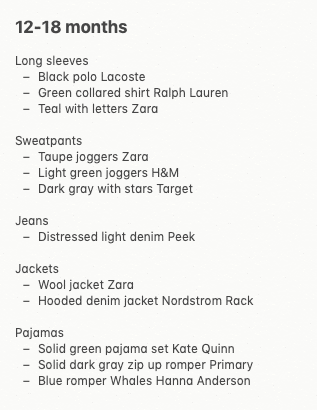
Tips for making your own inventory list:
- If an item runs really big or really small (you can see by holding it up to other clothes), categorize it with the clothing it fits like.
- You can also record things like sleep sacks, shoes, socks — or anything you’re going to need in multiple sizes.
- Record whatever helps you remember the item. You may need more or less detail than I do!

Get my favorite drawer dividers here.
 Do some online shopping before baby comes
Do some online shopping before baby comes
One of my favorite things to do before baby while lying in bed was scour the internet for the most highly recommended baby gear.
Here’s a short list of my favorite postpartum and newborn products:
- pumping bra
- nursing bras
- (not ugly) pacifier clips
- all-in-one cooler (no icepacks needed)
- dishwasher basket for bottle parts (tip: get 2)
- bath tub (great from 0-9+ months)
- ready-to-feed formula (important to have on hand even if you’re planning to breastfeed)
I did most of my baby shopping during my 2nd trimester of pregnancy because I was so excited. It’s also nice to be prepared in case your baby comes earlier than expected, as mine did!
 Audit your baby registry for safety
Audit your baby registry for safety
If you’ve already had your baby shower, you can and should still do this.
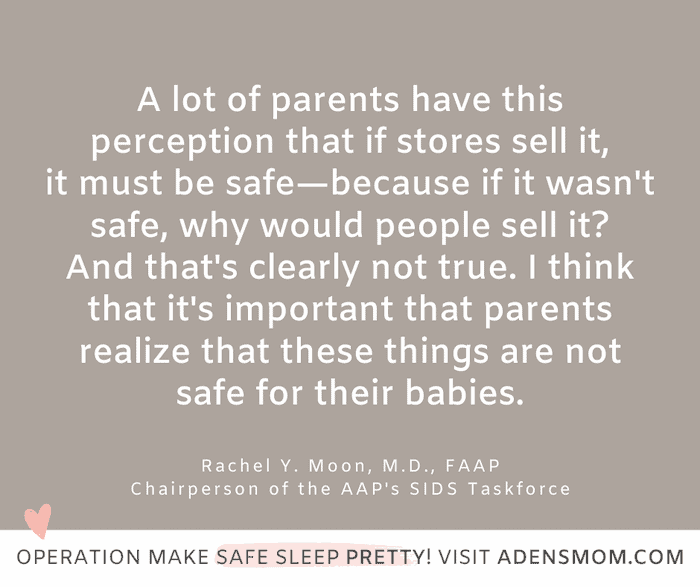
One of the very best things to do before baby is to learn which products are safe — and which products are ONLY safe if used in specific ways.
Here’s a quick list of baby items with serious safety concerns to be aware of:
- DockATot, SnuggleMe, and any similar “nest” product
- 3-sided co-sleepers or bassinets with drop-down sides such as Arms Reach
- Nested Bean and Dreamland Baby
- Baby Merlin’s Magic Sleepsuit
- Bedding sets with bumpers, rail covers, and quilts
- Swaddles for older babies
- Pack N Play with attachments
- Crib tent
- All positioners, wedges, and anti-flat-head pillows
Read about the safety risks in this evidence-based guide: 8 Things to DELETE from Your Baby Registry — and What to Register for Instead
Email this to yourself:
 Find out your hospital’s check-in procedures
Find out your hospital’s check-in procedures
Ask if you need to pre-register and/or fill out any paperwork where you’ll be giving birth. (This may or may not be necessary, as sometimes it’s handled by your OBGYN’s office).
You should also find out if the hospital wants you to call ahead when your water breaks or your contractions start.
Make sure you know where to park when you get there and whether there’s a place to temporarily leave your car if you don’t have time to park.
Our hospital wanted me to put a “Woman in Labor” sign in the window with our contact information.
You should also take a moment to save L&D’s phone number in your phone, along with the hospital address.
So, grab a snack, turn on an air purifier for your partner’s sake, and figure out this hospital stuff from bed.
Conversations to have before baby comes
A big part of preparing for a new baby is getting on the same page with your partner and support system. Here are a few chats you’re definitely going to want to have during your third trimester of pregnancy…
 Finalize your baby’s name
Finalize your baby’s name
Some people wait to decide their baby’s name until they meet him or her. At the very least, make sure you have it narrowed down and that you’re in agreement with your partner!
Here are some curated lists of baby names to check out:
BOY NAMES
- 390 Strong Boy Names with Masculine Charm
- 215 Epic Earthy Boy Names for your Outdoorsy Dude
- 380+ Meaningful Boy Names {Deep, Unique & Sentimental}
GIRL NAMES
 Set guidelines for anyone who wants to meet your newborn
Set guidelines for anyone who wants to meet your newborn
Thankfully, this is another pregnancy checklist item that you can do from the comfort of your bed.
Here are a few things to think about:
- Will you allow visitors in the hospital?
- How soon will you allow visitors to your home?
- Will you require that visitors are vaccinated for Tdap and the flu? (Hint: You absolutely should)
- What precautions will you be taking due to COVID-19?
Here’s some help with talking to your family about requiring vaccines to meet the baby…
Who should get Tdap and flu vaccines?
According to the CDC,
Newborns do not yet have fully developed immune systems, making them particularly vulnerable to infections. Because of this, anyone who is around babies should be up to date on all routine vaccines, including whooping cough vaccine… [and] flu vaccine during flu season.
My husband and I both got our vaccines, and so did our family members and friends who wanted to meet our newborn.
If you’d like to read more about vaccines in relation to meeting a newborn baby, here’s the info from the CDC.
How to ask your family to get whooping cough (Pertussis) and flu vaccines
You’ve got lots of options here: text, email, call, facetime, or speak in person. My husband and I chose to have our moms send a pre-written text to everyone in our families. (See my template below!)
Every family dynamic is different and you know your own family best. In our case, we knew no one would give us backlash or get offended.
Knowing your own family’s tendencies, you should communicate in a manner that keeps everyone’s emotions at bay and the debate to a minimum. The goal is to be friendly but matter of fact in stating your requirements.
The nice thing about texting or emailing is that it’s easier to stick to your guns (without getting emotional) if someone gives you a hard time. Plus, everyone gets the same note, so no one feels singled out.
Sample note to family members about getting vaccines before meeting the baby
Feel free to jazz this up to make it sound more friendly and more like you. Or, if a note seems too impersonal, have this conversation in person and use this for talking points.
Hi everyone!
As our due date gets closer, we just wanted to send out a quick note so you’re able to make plans if you’d like to come meet the baby.
Based on our doctor’s advice and CDC guidelines, in order to protect our newborn, we are asking the following of all visitors:
- Must have an up-to-date Tdap shot. This means you’ve had the shot within the last 10 years. (If you haven’t gotten one or aren’t sure if you have, you’ll need to have been vaccinated 2 weeks before meeting the baby).
- This year’s flu shot. (Must have been vaccinated 2 weeks before meeting the baby).
- No kissing the baby. We know this will be hard!
- Please let us know if you aren’t feeling 100% or if you’ve had any illness in your household the week before visiting.
We recognize that everyone might not be comfortable with these terms, so if you’d prefer to wait to meet the baby until after he has had his own vaccines, that’s an option too!
We hope you understand and we can’t wait to introduce you to our tiny human!
Very important tip: I can tell you from first-hand experience that you should encourage expected visitors to get their vaccines sooner rather than later.
Aden was born 3 weeks early and several family members had only just gotten their vaccines a few days prior. (In other words, it hadn’t been the required 2 weeks). We had to make some very tough calls not to let these loved ones visit right away.
 Discuss plans and expectations with your partner
Discuss plans and expectations with your partner
I truly can’t emphasize this enough: it is CRITICAL to have certain conversations with your partner before you go into labor and have a tiny human to co-parent.
There’s little stuff, like coordinating where to be and when — and there’s also big stuff, like emotional support and division of responsibility.
Conversations to have with your partner before your due date
![]() What will you do if your water breaks or contractions start?
What will you do if your water breaks or contractions start?
- Will your partner be reachable at work?
- How far is he from home, from your own place of work, and from the hospital?
- Will he be able to drive you to the hospital?
![]() What type of support do you need from your partner while you’re in labor?
What type of support do you need from your partner while you’re in labor?
- How can he help if you’re anxious or in pain?
- What would you like his demeanor to be?
![]() What DON’T you want him to do?
What DON’T you want him to do?
- Are you worried he’ll be on his phone?
- Is there something specific he’d be likely to say that would be irritating or triggering?
![]() Who will be in the room while you’re giving birth?
Who will be in the room while you’re giving birth?
![]() Do you want pictures of the birth?
Do you want pictures of the birth?
- If yes, what types of shots and who will take them?
- If no, make this crystal clear.
![]() Do you want your partner to send updates to family members?
Do you want your partner to send updates to family members?
- If yes, at what points and to whom?
- If no, make this clear too.
![]() If there’s a complication, do you want your partner to stay with you or go with the baby?
If there’s a complication, do you want your partner to stay with you or go with the baby?
![]() Are there any sticky situations with family members that you want to make sure you’re on the same page about?
Are there any sticky situations with family members that you want to make sure you’re on the same page about?
![]() What about when you’re back home…
What about when you’re back home…
- Has your partner heard of the “baby blues” and postpartum depression?
- Is he aware of the hormonal changes you’ll be experiencing and does he know how to support you through them?
![]() How hands-on do you want him to be with the baby?
How hands-on do you want him to be with the baby?
- Do you expect him to change diapers and give bottles?
- Is he prepared to take shifts with you so you’re able to get a minimum of 4 hours in a row of uninterrupted sleep?
![]() What about taking care of the household?
What about taking care of the household?
- Are there chores you want him to ‘officially’ be in charge of once you’re home with the baby?
![]() And lastly, don’t forget to ask your partner about his own expectations, hopes, and concerns!
And lastly, don’t forget to ask your partner about his own expectations, hopes, and concerns!
The more openly you discuss these things while you’re still pregnant, the better your experience will be.
Email this to yourself:
I also want to note:
If you’re first time parents, it’s highly possible that neither of you has any clue about what to expect, which makes it really difficult to answer all of the questions I listed above. Totally normal!
This next section will be really helpful with this…
Mentally prepare for labor and delivery before your due date
The truth is that even if you’ve taken all the birthing classes, read all the books, and watched all the movies, nothing will fully prepare you for the experience you’re about to have.
That said, there are a few things that will help you get ready for the life-changing experience of giving birth.
 Write a birth plan
Write a birth plan
Making a birth plan forces you and your partner to think through all of the little details involved before, during, and after labor.
The purpose of a birth plan is to make your preferences known to your medical team. It’s supposed to be a succinct document that addresses things like whether or not:
- You want an epidural
- You’d like delayed cord clamping
- You consent to the recommended newborn treatments (Erythromycin, Vitamin K, Hepatitis B vaccine)
- You’re opting for circumcision (if having a boy)
If you have no idea what some of this stuff means (I didn’t!) or if you’re not sure what’s best for your baby, find out:
(a) what your OB recommends;
(b) what’s normal protocol at the hospital where you’ll be giving birth.
P.S. Do not be that person who decides to skip the newborn eye ointment because of an idiotic thread in your due date group. Follow your doctors’ recommendations.
A note about my own birth plan
As I went through this exercise myself, I realized it was pointless for me to give too many directives because I just wanted my doctors to do what they thought was best.
I also read through the hospital’s L&D protocols and saw that all of my preferences, such as skin-to-skin immediately after birth, were already standard procedure.
For these reasons, I didn’t end up giving my birth plan to my medical team. I just gave verbal direction about whether I was opting for an epidural and circumcision.
 Watch videos of real births
Watch videos of real births
This one is totally personal preference, so skip this if you hate the idea.
I like to be able to picture things so I can mentally prepare.
The best way to find videos is to search for birth vlog on YouTube. These typically aren’t ‘graphic’ as far as getting up in the mother’s hooha. 🙂
Vlogs will give you a play-by-play of things like driving to the hospital, experiencing contractions, pushing, and holding your baby for the first time.
TIP: You might want to watch a few highlights with your partner. It’s a great starting point for conversations about how he can support you during labor. For my husband, this made things much more real.
 Take a virtual hospital tour
Take a virtual hospital tour
As a pregnant first time mom, it may be comforting to picture the environment in which you’ll be laboring. It also helps you determine what to pack in your hospital bag.
For example, is there a tub? If so, do you want to bring a bikini top? (Totally fine to go nude). What’s the food situation… should you pack lots of snacks? You get the idea!
Pre-baby lists to make
When you’re pregnant and tired, one of the best things you can do from bed is get organized. Write down everything you need to do, buy, make, research, pack, etc. Then, when your energy hits… EXECUTE!
I suggest making the following checklists of things to do before baby…
 Start an “OMG it’s go time” list
Start an “OMG it’s go time” list
It’s hard to think clearly after your water breaks (and/or your contractions start). This is your list of all the little things you want to remember to do right before you leave for the hospital.
Here are some items I included on my own list:
- Turn off the AC/heat
- Text the neighbors (see why below)
- Leave out extra food for the cat
- Hide the spare key for friend coming to pick up the dog
Keep this list on your phone or stick it somewhere visible like the fridge.
 Create a house prep list
Create a house prep list
Put together a house-related to do list like you would if you were going out of town.
If you have a vaginal birth at full term without complications, you’ll probably be in the hospital for 2 nights. But, you never know how things will go. It’s wise to plan to be away longer, just in case.
Here are a few examples of what to put on this house checklist:
- Ask a neighbor to pull out your trash bins
- Unplug any potentially hazardous appliances
- Clean out your refrigerator (get rid of anything that could go bad)
- Make sure there’s no wet laundry in the washing machine
- Secure your house or turn on lights to deter break-ins
Lots of this is last-minute, so feel free to merge it with your “OMG” list above.
 Work on your hospital bag packing list
Work on your hospital bag packing list
While you’re lying in bed, jot down a list of stuff to pack for L&D. It will make your actual packing much more efficient.
(I’d suggest doing the actual packing no later than a month before your due date).
My top piece of advice for packing your hospital bag is NOT to overanalyze or stress about it.
The hospital will have you covered on the vast majority of what you need.
Many moms obsess over getting a special robe, bringing the perfect postpartum pajamas, and what “type” of bag to carry their stuff in…
Please, mamas, don’t worry about this stuff. Just bring any comfy pajamas. And trust me, no one cares about what bag you bring.
My must-haves for the hospital:
Also, if you’re a finicky sleeper, bring your own pillow. Hospital pillows are made out of plastic.
 Build a master list of things to do before baby
Build a master list of things to do before baby
I kept a running list on my phone of every little thing I was afraid to forget. Pregnancy brain is no joke!
A few things to include:
- Sterilize bottles, pacifiers, and breast pump parts
- Pre-wash baby’s NB and 0-3m clothes
- Build your postpartum kit
- Get your car cleaned
- Prepare at least one safe sleep space
- Make a breastfeeding and pumping station
- Pack your diaper bag
- Set up the baby monitor
- Put together a car caddy of backup supplies
Here is my third trimester checklist that contains more information about everything you need to do [out of bed] before your baby arrives.
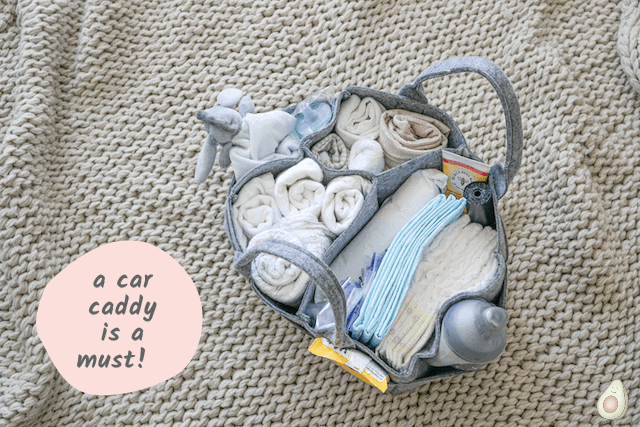
Backup baby supplies! Grab my car caddy here.
Stuff to figure out before baby (while you’re lying in bed!)
No physical effort needed, but make sure you’ve got a bit of mental energy for this section. These are critical things to take care of in your third trimester of pregnancy.
 Check with your health insurance provider about adding baby to your policy
Check with your health insurance provider about adding baby to your policy
Nobody likes dealing with insurance, but it’s important to get your ducks in a row while you’re still pregnant.
You’ll probably have to wait until your baby is born to add him/her to your health plan. You’ll be asked to provide the newborn’s social security number, date of birth, and full name. Call your insurance company or visit their website to be sure.
Keep in mind, there’s likely a buffer period during which your baby is covered as an extension of you. For us, this period was 30 days. Make sure to find out the deadline to sign your newborn up for health insurance.
 Choose a pediatrician
Choose a pediatrician
You can start by asking your OBGYN and local friends for recommendations.
You can also ask in local moms groups on Facebook and get some crowdsourced suggestions.
Those resources should probably be enough, but if not, you can get a list from your insurance company of pediatricians covered by your plan.
You’re not married to whichever doctor you choose — remember that! It helps take some of the pressure off of the decision.
 Plan maternity leave and paternity leave
Plan maternity leave and paternity leave
There are two things to check: your state’s policies and your company’s policies for family leave.
You and your partner may qualify for state benefits (in addition to what your companies provide) before and after the birth of your child.
Things to look into regarding family leave:
- How many total days are you able to take off?
- How will you be paid during those days? No pay, half pay, full pay…?
- Do you need to fill out paperwork for HR and give them your due date?
- Will you and your partner take off at the same time?
- Can your partner stagger the days he takes off instead of taking them all at once?
- Do you need to file paperwork with the state?
- Is there anything else you need to know about getting paid?
We decided to stagger my husband’s paternity leave and I’m SO GLAD we did! He took a week off when our baby was born. Then, he took 2 days off per week for the next few months. It worked out great!
My husband rocking paternity leave!
Things to plan before baby is born
Here are a few time-sensitive pre-baby to-dos that you’ll want to take care of in your third trimester of pregnancy.
 Schedule a car seat inspection
Schedule a car seat inspection
The National Highway Traffic Safety Administration (NHTSA) reports that 59% of car seats are not installed correctly.
If you’re super safety-conscious like I am, you’ll want to make sure you’re not part of this statistic.
The great news is that car seat checks are FREE.
You might even be able to find a non-profit organization that will come to your house.
Here are a few resources to get you started:
- NHTSA (Scroll way down to where it says “Car Seat Inspection”)
- Call 1-866-SEAT-CHECK
- Google “car seat check” or “car seat inspection” + the name of your city. Your local police or fire department might provide this.
- AAA also offers free car seat inspections in the West.
Schedule your appointment a few weeks before your due date. Then, keep the base installed and remove the seat, just in case you get into an accident before baby comes.
Side story: I had a CPST scheduled to come to my house, but Aden was born early. The amazing tech met us at the hospital and installed the seat for us and then came up to our hospital room to show us how to adjust the straps!
 Coordinate care for your fur kids and human kids
Coordinate care for your fur kids and human kids
Most people don’t know exactly when they’ll give birth, so make sure your plans include last-minute contingencies.
This will probably take some phone calls and coordinating—all of which you can do right from your bed while you rest your very pregnant self.
 Decide whether you’ll be taking newborn photos and look for a photographer
Decide whether you’ll be taking newborn photos and look for a photographer
If you’re not sure who to hire, talk to your friends or ask in a local Facebook group.
You want to find someone who is fully immunized and who makes safety their priority.
Also, don’t feel any pressure to get newborn photos taken. Not everyone gets them done. We didn’t!

Videos to watch before baby comes
One of the best things to do before baby is learn about newborn care. Video tutorials are great for this.
 Learn how to swaddle (and practice on a stuffed animal)
Learn how to swaddle (and practice on a stuffed animal)
Even if you don’t plan on “swaddling” because you’re going to use swaddle sacks, this is a handy skill to have.
Here’s a short video that you should watch if you’ve never done this before. I really recommend practicing on a stuffed animal or doll!
(She makes it looks so easy! …)
3 related tips while we’re on the subject of swaddling:
![]() Bring a swaddle sack with you to the hospital! It’s SO much easier than having to wrap your baby in a receiving blanket (like in the video) or call for a nurse each time you change your newborn’s diaper.
Bring a swaddle sack with you to the hospital! It’s SO much easier than having to wrap your baby in a receiving blanket (like in the video) or call for a nurse each time you change your newborn’s diaper.
![]() There are 2 types of swaddle sacks that I highly, highly recommend. I had 2 of each!
There are 2 types of swaddle sacks that I highly, highly recommend. I had 2 of each!
![]() Know when to stop swaddling. According to the AAP, due to the risk of suffocation, it’s critical to stop swaddling as soon as your baby starts showing signs of rolling. Read more about the safety of swaddling.
Know when to stop swaddling. According to the AAP, due to the risk of suffocation, it’s critical to stop swaddling as soon as your baby starts showing signs of rolling. Read more about the safety of swaddling.
 Take your breast pump out of the box and watch a video on how to use it
Take your breast pump out of the box and watch a video on how to use it
If you have time to learn how to use your breast pump before baby comes, you should!
I waited until Aden was born to read the directions for the first time. It felt so intimidating — probably because I hadn’t slept in a week.
If you happen to be using the Spectra (the #1 recommended breast pump by far), I’m including a video right here!
I like that this video shows you the setup, not just the use.
(Note: This video says it’s for Spectra S2 but it’s the same exact info for S1).
You can always re-watch this when it’s actually time to pump for the first time. DO NOT pump while you’re pregnant.
P.S. Don’t forget to sanitize all the parts before baby comes!
 Learn how to properly use the Haakaa
Learn how to properly use the Haakaa
I’m assuming you already own one of these.
(Most breastfeeding moms will tell you this is a must-have).
The Haakaa is essentially a suction cup that you stick on one boob while baby nurses on the other. It just hangs there collecting milk. Super easy.
It’s actually shocking how much milk gets collected, especially considering you’re not doing anything to pump it out.
If you use the Haakaa every time you nurse, you’ll build up a freezer stash of breastmilk in no time.
The trick you need to know is how to create that ‘extra’ level of suction power with your Haakaa. Not only will you express more milk (with no added effort) but you won’t have to worry about the suction breaking (i.e. the milk spilling everywhere).
Whoever said “don’t cry over spilled milk” doesn’t know what it’s like to spill the breastmilk you just pumped.
This trick is super simple. The video below will start playing right at the part you need to pay attention to (1:41).
 Watch a babywearing tutorial
Watch a babywearing tutorial
I’m not exaggerating when I tell you that my wrap baby carrier is how I survived the first few months of motherhood.
Before your baby arrives, take a few minutes to watch a video about how to tie this thing. Here’s a good instructional video for the Moby wrap.
It will feel complicated the first several times you do it, but eventually you’ll be able to do it in your sleep! (That is, if you ever get any sleep, ha!)
If you can, practice doing it while you’re pregnant so you can build the muscle memory before baby comes. It might be a little hard with your belly in the way, but do the best you can!
Tips for safely babywearing
Use the acronym, TICKS, to remember!
T – Tight
I – In view at all times
C – Close enough to kiss
K – Keep chin off the chest
S – Supported back
 See how to calm a crying baby
See how to calm a crying baby
I can’t guarantee that this will always work, but holy cow is this cool.
Check out this wizardry…
Prepare for the 4th trimester before baby arrives
The “4th trimester” refers to the first 3 months of your baby’s life. It’s a period of major adjustment for both of you.
So many new parents (understandably) lose their minds because they try to make their newborns act less like newborns.
It’s so important to know what’s normal and UNCHANGEABLE about having a newborn so you can plan for it while you’re tackling your list of things to do before baby!
What to expect when you bring your newborn home
- Your baby is going to want to be held all the time. He’ll often cry when you put him down. Showering, cooking, and cleaning will become a challenge.
- Baby will have trouble sleeping anywhere but your arms. He’s not going to like sleeping in his bassinet.
- Once you do get him to sleep in his own bed, he’s going wake frequently and will probably make funny noises in his sleep.
- He will likely have “colic” or digestive issues.
- You’re going to be feeding him FREQUENTLY. The time between feedings will fly by.
Not every baby is the same, but all of this is pretty typical at varying degrees. (Newborns are lucky they’re so cute!)
 Call in the troops!
Call in the troops!
(Or at least make sure they’re on standby).
Before baby comes, activate your support system. It may be awkward to ask for help, but grit your teeth and do it.
Here are ideas for the type of help to ask for:
- Come over and hold the baby while you shower or take a nap
- Bring over a hot meal or organize a meal train
- Walk the dog
Unless you’ve got a ton of local friends and family, you’ll probably rely on the recurring assistance of a few loved ones. Speak to those people before baby comes to get a sense of their availability and willingness to help.
 Make a tentative sleep plan with your partner
Make a tentative sleep plan with your partner
I know baby isn’t here yet, but you can still start strategizing while you’re pregnant. Tweak the plan as needed once the tiny human arrives.
Talk to your partner about your options for taking shifts. At a minimum, you need one uninterrupted 4-hour stretch of sleep per night (or day). You will run out of steam really fast if you’re the only caretaker up all night with the baby.
Don’t just wing it! “Sleeping when baby sleeps” tends to be impractical and insufficient.
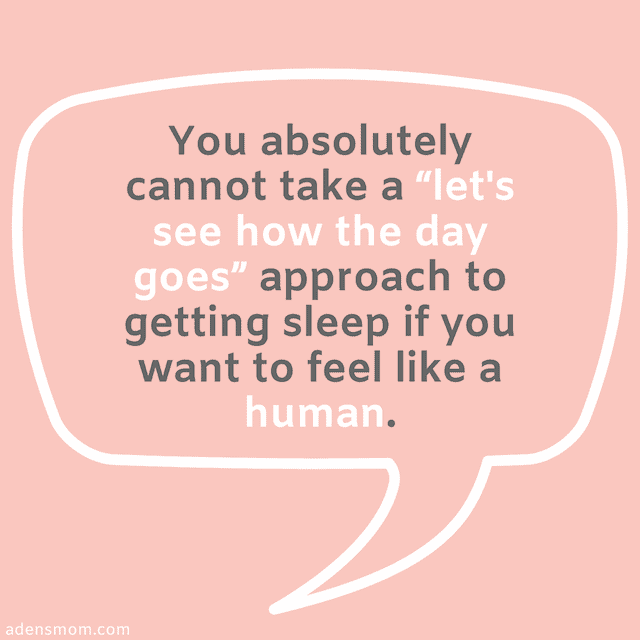
 Learn about the period of PURPLE crying
Learn about the period of PURPLE crying
As a new parent, it’s easy to get discouraged when your baby is inconsolably crying and you’ve tried every trick in the book without success.
PURPLE is an acronym that makes sense of this. It refers to a developmental period between 2 weeks and 4 months of age in which long-lasting bouts of crying are normal.
I can tell you from personal experience that just knowing that crying is a normal phase can ease some of the mom guilt and reduce any anxiety that something is wrong.
Take 10 minutes to read about this before baby comes so you know what to expect.
Things to learn about before baby
Maternal instinct will only take you so far. There’s some stuff you’re actually going to want to read about (from evidence-based sources) during pregnancy to keep your baby safe and healthy.
 Educate yourself about how to prevent the #1 cause of infant death
Educate yourself about how to prevent the #1 cause of infant death
Did you know that SIDS is the leading cause of death for healthy, full-term babies?
Did you know it’s almost entirely preventable?
Did you also know that the VAST MAJORITY of baby sleep gear you see on social media is actually unsafe?
Most well-meaning parents have no clue that they’re risking their babies lives just by doing what everyone else is doing.
This is a complicated and nuanced subject, but I’m going to give you a quick preview of things that the scientific evidence tells us are unsafe:
Unsafe for infant sleep:
- Letting your baby sleep in a swing or lounger, even if you’re watching.
- Swaddling your baby once he shows signs of being able to roll over.
- Adding anything to your baby’s crib besides a single mattress pad and a fitted sheet.
- Allowing your baby sleep in his car seat after you get home from an outing.
This isn’t “you do you, mama.” This is science.
Do not, I repeat, DO NOT rely on other people’s anecdotes, opinions, and perceptions to keep your baby safe.
If you’re brand new to this subject, you can start with my evidence-based guide: Intro to Safe Sleep + Preventing SIDS.
Email it to yourself:
 Read these surprising bottle feeding rules
Read these surprising bottle feeding rules
In many ways, giving your baby a bottle is self-explanatory. But not entirely!
Here’s one guideline as an example:
Did you know that when your baby starts a bottle but doesn’t finish it, you have only one hour to feed the remainder of the bottle? Even if you refrigerate the leftover milk, you need to toss it after an hour.
That totally surprised me! Anyone else?
Check out my evidence-based post about 6 important bottle feeding guidelines that your maternal instincts won’t tell you.

Other things to do before baby
Now we’re getting into some miscellaneous things to do before baby. Just like everything else on this to do list before baby, all of this can be done while lying down in bed!
 Write thank you notes
Write thank you notes
You probably have lots of people to thank for the gifts you’ve received at your shower.
Maybe I’m old school, but I believe people should still send handwritten thank you notes.
Don’t wait until your baby is born to do this! Trust me, it’s the last thing you’re going to feel like doing.
If you haven’t had your shower yet, just address the envelopes.
 Beautify, take care of yourself, recharge
Beautify, take care of yourself, recharge
I know you’re thinking “duh” – but honestly, this category deserves its own check box on your list of things to do before baby.
If you don’t intentionally make time for self care, it’s not going to happen. And if you think it’s hard to find time for that now, just wait until your newborn arrives!
I like to multi-task my self care…
- Catch up with a friend – while letting some Olaplex (liquid gold!) soak into my hair – while giving myself a manicure.
- Watch some binge-worthy reality TV while lying on my favorite massage pillow with a pore-cleansing mask going to town on my face.
Oh, and don’t forget the very best thing to do in bed before baby arrives… SLEEP!
Final tips on tackling your to do list before baby while lying in bed
Preparing for a new baby can feel extremely overwhelming, especially if you’ve never done it before.
Not to mention, when you’re very pregnant, everything is ten times more difficult.
Do your best to work on one small piece of your pre-baby to do list each day. Even on your hardest days when you’re totally exhausted, watch a 10 minute birth vlog in bed or read an article about newborn care while your partner massages your feet.
You’ve got this, mama!
Related to things to do before baby:
- Baby’s First Week Home: The 8 Products I Used the Most
- 9 New Mom Survival Tips: Practical Advice for Staying Sane
- The Ultimate List of New Mom Hacks: 60 Tips & Tricks for Life With a Baby




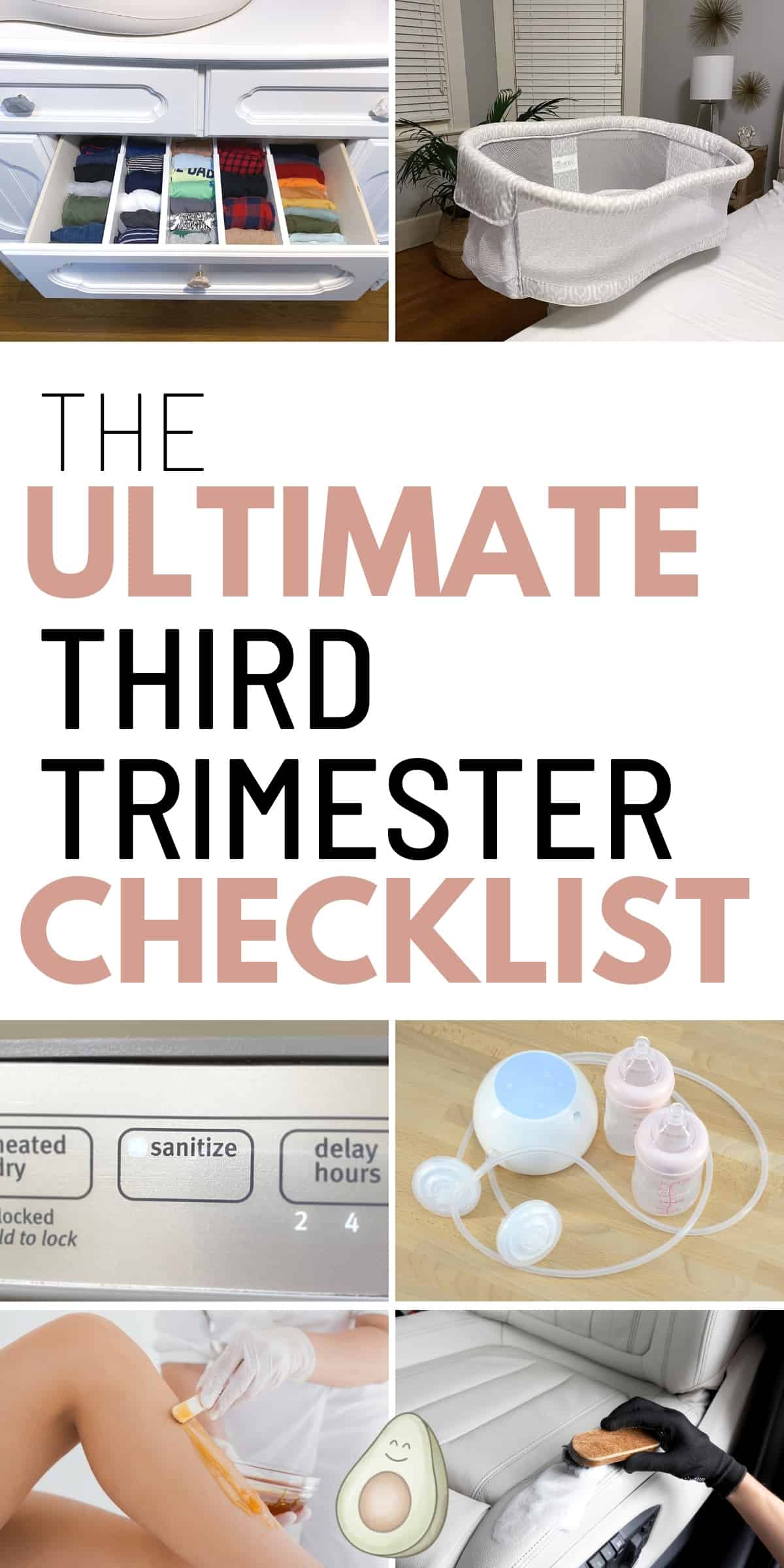
 Follow on Pinterest
Follow on Pinterest